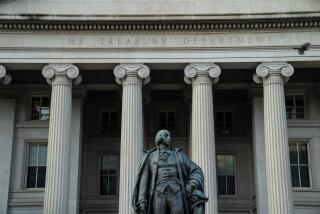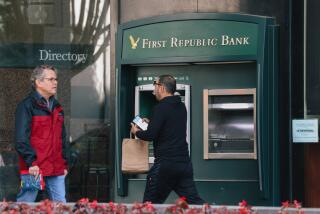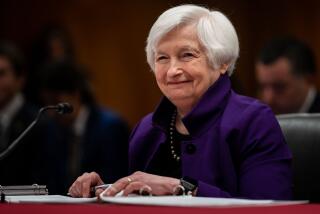Fed Underscores Role as Lender of Last Resort
- Share via
NASHVILLE — Massive direct loans by the Federal Reserve prevented a seizure in the U.S. banking system as payments ground to a halt in the days after the Sept. 11 terrorist attacks, Federal Reserve Vice Chairman Roger Ferguson said Wednesday.
In a speech to the Owen Graduate School of Management at Vanderbilt University, Ferguson provided an unusually detailed look at how the Fed approached the payment crisis after the terrorist attacks, and underscored the central bank’s role as a lender of last resort in a time of financial crisis.
The speech may have been aimed in part at reminding investors that the Fed would stand ready to assist the financial system if it again seized up in the event of a war between the United States and Iraq or another international crisis.
On Sept. 12, 2001, direct loans by the Fed to banks through the facility known as the discount window totaled $46 billion, more than 200 times the daily average for the previous month, Ferguson said.
“The failure of some banks to make payments” because of damage to the communications and other infrastructure began to disrupt the flow of money transfers across the system, he said. “Once a number of banks began to be short of incoming payments, some became more reluctant to send out payments themselves,” he said. “In effect, banks were collectively growing short of liquidity.”
Aside from encouraging banks to borrow directly from the Fed through the discount window, the central bank injected cash into the banking system through bond purchases, waived overdraft fees on short accounts and helped foreign banks provide liquidity to their U.S. affiliates, he said.
The Fed also allowed checks to clear, even though the closure of U.S. airspace slowed the shipment of physical checks to their home banks for payment, he said.
Wall Street runs on short-term credit, so a seizure in fund transfers can trigger loan defaults across the system. Ferguson said the events of Sept. 11 showed the need for the Fed to remain involved in financial market supervision and to maintain its role as lender of last resort to the financial system.
“From our experience, we should recognize the benefits of a central bank that can influence the economy and enhance financial stability,” he said.
More to Read
Inside the business of entertainment
The Wide Shot brings you news, analysis and insights on everything from streaming wars to production — and what it all means for the future.
You may occasionally receive promotional content from the Los Angeles Times.










